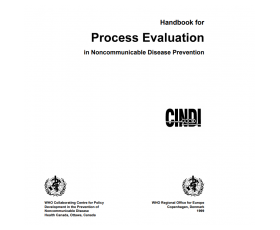WHO Regional Office for Europe Copenhagen, Denmark (1999). Handbook for process evaluation in noncommunicable disease prevention.Copenhagen

Abstract
The countrywide integrated noncommunicable diseases intervention (CINDI) programme of the World
Health Organization (WHO) is a collaborative effort aimed at preventing disease and promoting health.
The handbook for process evaluation in noncommunicable disease prevention is intended to serve as a
tool for documenting preventive intervention projects and the processes that determine the impact of
intervention. It will complement two earlier CINDI documents: the Protocol and guidelines —
countrywide integrated noncommunicable disease intervention programme (1995), which explains the
structure of the CINDI programme and outlines evaluation procedures that emphasize outcome indicators;
and Positioning CINDI to meet the challenges: a WHO policy framework for noncommunicable disease
prevention (1992), which discusses policy directions and describes collaborative projects that may be
undertaken using various CINDI strategies.
The handbook sets out a framework for evaluation which can assist individual CINDI programmes to
further develop the capacity to carry out process evaluations, and to select those indicators and systems that
are best suited to track their particular project inputs, outputs and processes.
Full implementation of a process evaluation system requires the development of instruments for data
collection, the training of personnel in gathering and processing information, as well as the piloting of the
evaluation protocols. While this handbook provides guidance in a number of areas, more experience is
needed in the use of process evaluation to recommend specific procedures in some areas. To this end, a
second version of this handbook will be considered in the future.
Abstract
The countrywide integrated noncommunicable diseases intervention (CINDI) programme of the World
Health Organization (WHO) is a collaborative effort aimed at preventing disease and promoting health.
The handbook for process evaluation in noncommunicable disease prevention is intended to serve as a
tool for documenting preventive intervention projects and the processes that determine the impact of
intervention. It will complement two earlier CINDI documents: the Protocol and guidelines —
countrywide integrated noncommunicable disease intervention programme (1995), which explains the
structure of the CINDI programme and outlines evaluation procedures that emphasize outcome indicators;
and Positioning CINDI to meet the challenges: a WHO policy framework for noncommunicable disease
prevention (1992), which discusses policy directions and describes collaborative projects that may be
undertaken using various CINDI strategies.
The handbook sets out a framework for evaluation which can assist individual CINDI programmes to
further develop the capacity to carry out process evaluations, and to select those indicators and systems that
are best suited to track their particular project inputs, outputs and processes.
Full implementation of a process evaluation system requires the development of instruments for data
collection, the training of personnel in gathering and processing information, as well as the piloting of the
evaluation protocols. While this handbook provides guidance in a number of areas, more experience is
needed in the use of process evaluation to recommend specific procedures in some areas. To this end, a
second version of this handbook will be considered in the future.